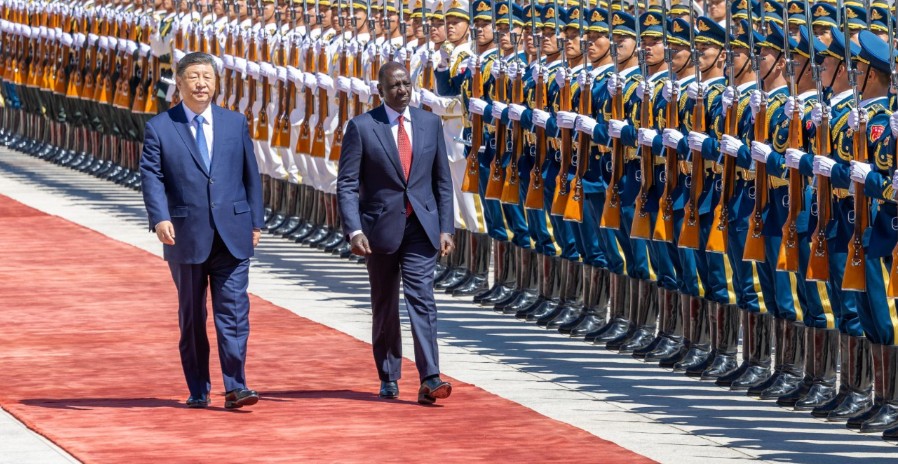Ruto’s Beijing visit marks Kenya’s strategic shift as One China policy becomes price of partnership

Facing a restless electorate, rising debt obligations, and limited Western financing, Ruto now finds himself reciting the lines once championed by President Mwai Kibaki, whose "Look East policy" birthed Kenya's infrastructure boom, including the standard gauge railway spearheaded by his successor, Uhuru Kenyatta.
President William Ruto is in Beijing, where he was hosted by the Chinese President Xi Jinping with full fanfare — red carpet, military band, and choreographed smiles.
It was a pageantry-rich welcome from President Xi Jinping, a spectacle of symbolism carefully curated by Chinese statecraft.
More To Read
- Tough decisions stabilised the economy, saved Kenya from shame – Ruto
- Ruto and Oburu strengthen UDA-ODM alliance after by-election win
- Ruto unveils Sh400 billion mega dam plan to turn North and Coast regions into Kenya's new food basket
- Ruto says 15,000 jobs on the horizon following launch of landmark highway expansion
- Ruto says Kenya can attain first-world status within three decades
- Petition filed to stop multi-billion Rironi–Nakuru–Mau Summit road project
But beneath the pomp lies a quiet reaffirmation of something far more telling: Kenya's geopolitical posture.
The most consequential moment? Not the banquet. Not the handshakes. It was Ruto's recital of the One China Policy — a diplomatic vow that Kenya "does not, and will not" recognise Taiwan as an independent state.
A necessary line for any country seeking favour in Beijing.
This was no surprise. The One China Principle is the foundation of China's foreign policy orthodoxy.
It is non-negotiable — the diplomatic red line that Beijing guards with uncompromising clarity.
Recognition of Taiwan as part of China is the price of entry for economic cooperation. That includes infrastructure, loans and trade preferences.
And the policy works: 53 African countries maintain diplomatic ties with China.
Only Eswatini, Taiwan's last remaining ally on the continent, holds out, enjoying Taiwanese aid, but at the cost of being shut out of Beijing's largesse.
The Sahrawi Arab Democratic Republic, which lacks widespread international recognition, is the only other African state without Chinese diplomatic ties.
Ruto's visit wasn't just about symbolism. It was also about strategic recalibration.
He entered office in 2022 with sharp rhetoric against Chinese loans, often blaming Beijing for Kenya's mounting public debt.
But reality — and geopolitics — has a way of softening positions.
Facing a restless electorate, rising debt obligations, and limited Western financing, Ruto now finds himself reciting the lines once championed by President Mwai Kibaki, whose "Look East policy" birthed Kenya's infrastructure boom, including the standard gauge railway spearheaded by his successor, Uhuru Kenyatta.
For Ruto, the Beijing visit was a quiet pivot from campaign populism to pragmatic diplomacy.
China, for its part, maintains the language of mutual respect and non-interference, often boasting of aid and investment "with no political strings attached."
But the One China Policy is the exception to that rule — a non-negotiable litmus test for trust.
It remains Beijing's most sensitive diplomatic red line, and Africa, by and large, has chosen to respect it, not out of ideology, but out of calculated national interest.
Ruto's embrace of that policy shows that in international relations, there are no permanent positions — only permanent interests.
Top Stories Today











































